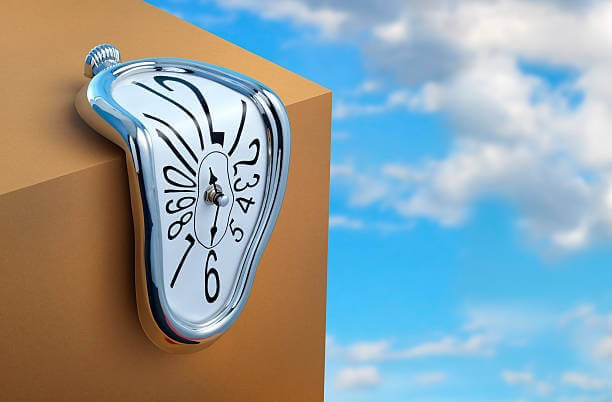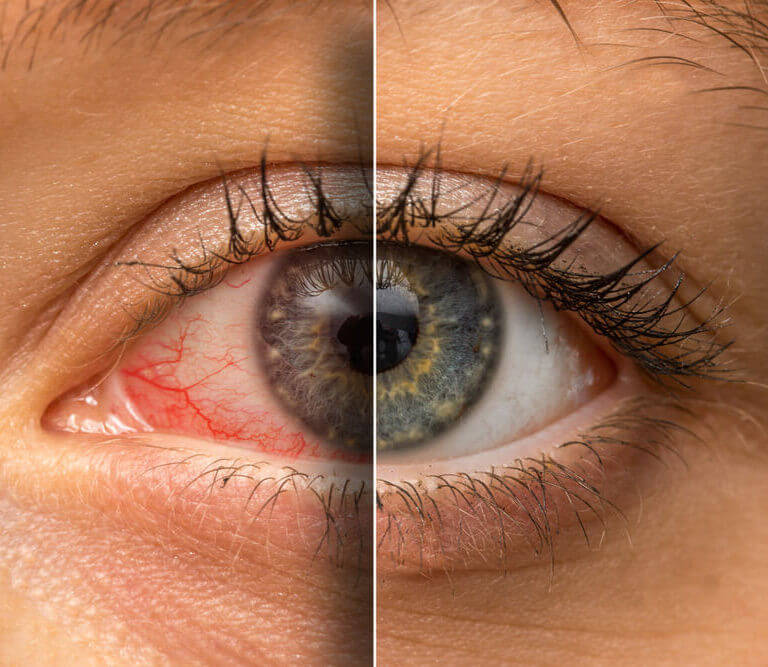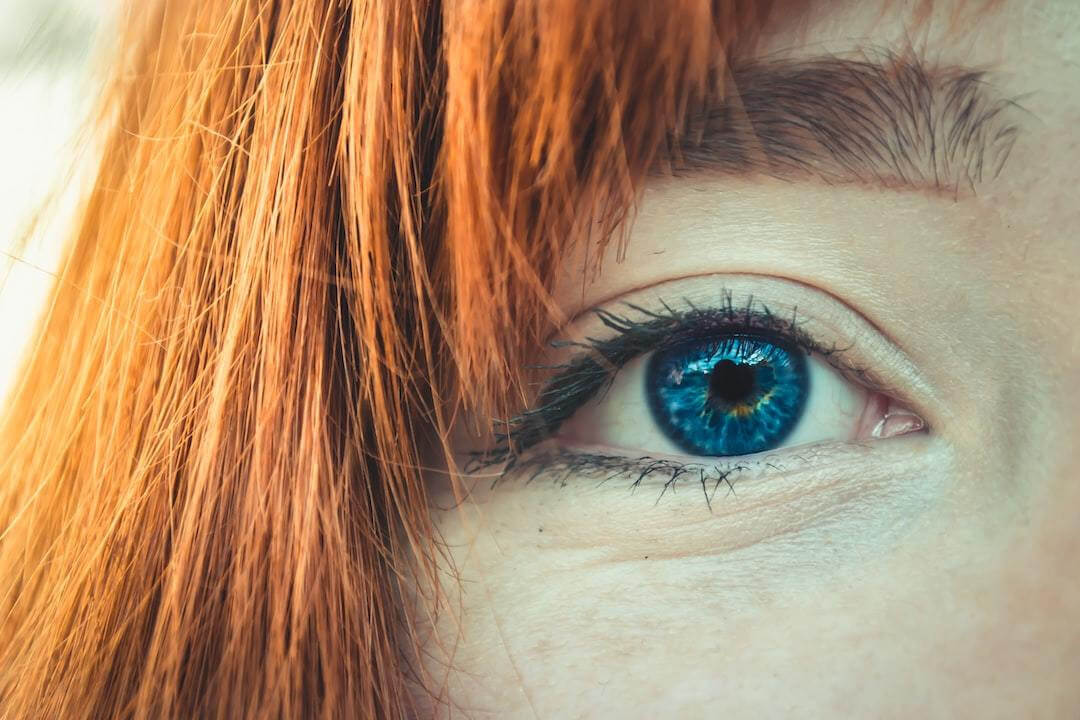Can you wear blue light glasses with contacts? This is a question many contact lens users have when considering ways to protect their eyes from the harmful effects of blue light. In this blog post, we will delve into the dangers of blue light exposure and explore whether wearing blue light glasses with contacts is an effective solution.
We'll discuss the benefits of combining these two eye protection methods and examine different types of blue light glasses available on the market. We'll also provide guidance on how to choose the right pair for your needs and offer tips for wearing contact lenses alongside blue light blocking eyewear comfortably.
By understanding the relationship between can you wear blue light glasses with contacts, you can make informed decisions about maintaining optimal eye health in today's digital world.
Table of Contents:
- Why is Blue Light Dangerous?
- The Impact of Blue Light on Our Eyes
- Potential Long-Term Effects of Blue Light Exposure
- Can You Wear Blue Light Glasses with Contacts?
- Why Combine Blue Light Glasses and Contacts?
- Potential Concerns When Wearing Both
- Benefits of Wearing Blue Light Glasses with Contacts
- Benefits of Wearing Blue Light Glasses with Contacts
- Types of Blue Light Glasses
- How to Choose the Right Blue Light Glasses for You
- 4 Tips for Wearing Blue Light Glasses with Contacts
- Can I Wear Blue Light Glasses Over Contact Lenses?
- Can You Wear Blue Light Glasses with Prescription Glasses?
- What Do Eye Doctors Say About Blue Light Glasses?
- Conclusion
Why is Blue Light Dangerous?
Blue light is a high-energy visible (HEV) light emitted by digital screens and electronic devices and has become a growing concern in today's technology-driven world. Exposure to blue light can have several negative effects on our eyes and overall health. We'll explore the potential risks with blue light exposure and why it's important to protect your eyes.
The Impact of Blue Light on Our Eyes
Our eyes encounter various sources of blue light on a daily basis, including natural sunlight, LED lamps, cell phones and tablets, computers, and television sets. While some amount of blue light is necessary for maintaining healthy sleep patterns and cognitive function, excessive exposure can lead to problems like:
- Digital eye strain or computer vision syndrome
- Dryness or irritation in the eyes
- Blurred vision
- Headaches or migraines
- Sleep disturbances due to suppressed melatonin production
Potential Long-Term Effects of Blue Light Exposure
Beyond immediate discomforts caused by excessive screen time and prolonged exposure to HEV rays from artificial sources, long-term risks associated with overexposure include:
- Aging-related macular degeneration (AMD): Studies suggest that continuous exposure to high-energy visible wavelengths may contribute significantly towards AMD development.
- Cataracts: Blue light can cause oxidative stress on the eye's lens, increasing the risk of cataracts.
- Retinal damage: Excessive blue light exposure may lead to retinal cell death and potential vision loss over time.
To reduce these risks and protect your eyes from harmful blue light emissions, its good to take preventive measures such as wearing blue light glasses or adjusting screen settings. In the next sections, we'll explore how you can wear blue light glasses with contacts for optimal protection.
Blue light can be damaging to our eyes and long-term exposure can lead to eye strain, fatigue, headaches and even potential damage to the retina. For people who wear contacts it's important to understand how blue light glasses may help protect their vision when exposed to digital devices.
Can You Wear Blue Light Glasses with Contacts?
The short answer is yes, you can wear blue light glasses with contact lenses. Blue light glasses are designed to filter out harmful blue light emitted by digital screens and other sources of artificial lighting. Wearing them in combination with your contacts provides an additional layer of protection for your eyes against the potential dangers associated with prolonged exposure to blue light.
Why Combine Blue Light Glasses and Contacts?
Contact lenses can rectify vision issues such as nearsightedness, farsightedness, astigmatism or presbyopia but do not provide any defense against damaging blue lights. On the other hand, some specialized contact lenses claim to block a certain percentage of blue light; however, they may not be as effective as wearing dedicated blue light glasses.
By combining both corrective contact lenses and protective blue light blocking glasses, you can enjoy clear vision while safeguarding your eyes from the negative effects of excessive screen time.
Potential Concerns When Wearing Both
- Dry Eye: Some people experience dry eye symptoms when using contact lenses for extended periods. Adding another layer in front of their eyes could potentially exacerbate this issue. However, choosing high-quality lens materials that allow oxygen permeability can help minimize discomfort.
- Fitting: It's essential to find a pair of well-fitted frames that don't interfere with your contact lens use or cause discomfort on your face during long hours at work or leisure activities.
- Adjustment Period: It may take some time to get used to wearing both contacts and blue light glasses, especially if you're new to either of them. Give yourself a few days or weeks to adjust before making any final decisions about their compatibility.
In conclusion, it is perfectly safe and beneficial for individuals who wear contact lenses to also use blue light glasses as an added layer of protection against digital eye strain. Just ensure that you choose the right pair of frames and materials for your needs and give yourself enough time to adapt comfortably.
For more information on blue light exposure and eye health, consult with your eye doctor or optometrist. They can provide you with additional tips and recommendations on how to protect your eyes from harmful blue light and other potential sources of eye strain, such as UV radiation and shorter wavelengths in the visible light spectrum.
Yes, you can wear blue light glasses with contacts. The benefits of wearing them are numerous and worth exploring in greater detail.
Visit Just Human today for a great selection of high-quality prescription and non-prescription blue light glasses with free shipping and free returns and a lifetime guarantee.
Yes, you can wear blue light glasses with contact lenses to protect your eyes from harmful blue light emitted by digital screens. Combining both corrective contact lenses and protective eyewear is beneficial for clear vision while safeguarding against the negative effects of excessive screen time. However, it's important to find well-fitted frames that don't interfere with your contacts and give yourself enough time to adjust comfortably.
Benefits of Wearing Blue Light Glasses with Contacts
As we spend more time on computers, smartphones, and other electronic devices, our eyes are exposed to shorter wavelengths of the visible light spectrum that may cause discomfort or even long-term damage.
A. Protection against Harmful Blue Light
Blue light, particularly the high-energy visible (HEV) portion of the spectrum, has been linked to an increased risk for macular degeneration and disrupted sleep patterns. By wearing blue light glasses in combination with your contacts, you can effectively block a significant amount of this potentially damaging radiation.
B. Reduced Digital Eye Strain Symptoms
Digital eye strain is a common issue among people who spend prolonged periods staring at screens. Signs of digital eye strain may include sore eyes, migraines, distorted sight and aches in the neck. Blue light glasses help alleviate these symptoms by filtering out excessive blue light emitted by electronic devices.
C. Enhanced Visual Comfort While Wearing Contacts
If you wear contact lenses regularly but still experience discomfort due to extended screen time or harsh lighting conditions, wearing blue light glasses can help improve overall visual comfort without needing prescription computer glasses.
Dry Eyes Relief:
- Contact lens wearers often suffer from dry eyes caused by reduced blinking rates during screen use; adding another layer of protection like wearing contacts can help.
- The anti-reflective coating on many types of contacts can also help reduce eye strain and dryness.
- Blue light glasses can help retain moisture and reduce the feeling of dryness in your eyes.
D. UV Protection for Contact Lens Wearers
While some contacts block blue light and offer UV protection, wearing blue light glasses with built-in UV protection adds an extra layer of defense against harmful ultraviolet rays that may cause cataracts or other eye issues. This is especially important if you spend a lot of time outdoors or work near windows where sunlight exposure is high.
Incorporating blue light glasses into your daily routine while wearing contact lenses can significantly improve your overall eye health and comfort during prolonged exposure to digital screens. With various styles available, it's easy to find a pair that suits both your needs and personal style.
Wearing blue light glasses with contacts can provide many benefits, such as reducing eye strain and improving sleep quality. Switching gears, those with contact lenses can select from a variety of blue light glasses.
Visit Just Human today for a great selection of blue light glasses that can be worn comfortably with contacts.
Wearing blue light glasses with contact lenses can provide protection against harmful blue light, reduce digital eye strain symptoms, and enhance visual comfort. It also offers dry eyes relief and UV protection for contact lens wearers. Incorporating blue light glasses into your daily routine while wearing contacts can significantly improve overall eye health and comfort during prolonged exposure to digital screens.
4. Types of Blue Light Glasses
Various types of blue light glasses are available to suit different needs and preferences. In this section, we will discuss some popular options that can help reduce digital eye strain when worn with contacts.
a) Clear Lens Blue Light Glasses
Clear lens blue light glasses are a popular choice for those who want protection from harmful blue light without altering their vision's color perception. These lenses have a clear appearance but contain special coatings or filters that block out a percentage of blue light emitted by digital screens. They're ideal for individuals who spend long hours working on computers or using other electronic devices.
b) Yellow-Tinted Blue Light Glasses
Yellow-tinted blue light glasses feature lenses with a yellow hue that helps filter out more significant amounts of high-energy visible (HEV) blue light than clear lenses do. The yellow tint also enhances contrast, making it easier to see fine details on screens and reducing eye fatigue during extended screen time sessions. However, these glasses may slightly alter color perception due to the tint.
d) Custom Prescription Blue Light Glasses
For those who require prescription glasses to correct their vision, custom prescription blue light glasses are an excellent option. These lenses can be made with your specific prescription and include a blue light blocking coating or filter. This allows you to enjoy the benefits of both corrected vision and protection from digital eye strain simultaneously.
When considering different blue light glasses think about your needs. When choosing blue light glasses, it is vital to consider various aspects in order to find the best fit for you.
Different types of blue light glasses are available to suit various needs and preferences, including clear lens, yellow-tinted, amber-tinted, and custom prescription options. These glasses can help reduce digital eye strain when worn with contacts by blocking out harmful blue light emitted by electronic devices. When choosing the right pair for you, consider factors such as lens tint and comfort level when worn with contacts.
5. How to Choose the Right Blue Light Glasses for You
Navigating the numerous choices of blue light glasses to suit your requirements and way of life can be daunting. Here are some factors you should consider when choosing blue light glasses while wearing contacts:
A. Determine Your Purpose
First, identify why you need blue light glasses - is it primarily for work or leisure? If you spend long hours working on digital devices, look for lenses with higher blue light filtering capabilities to protect your eyes from excessive exposure.
B. Consider Lens Tint and Coating Options
Lens tint and coating play a significant role in determining how effective your blue light glasses will be at reducing eye strain. Yellow-tinted lenses block more blue light than clear lenses but may alter color perception slightly. Clear lenses with anti-reflective coatings are less noticeable but might not provide as much protection against high-energy visible (HEV) blue light.
C. Prescription Compatibility
If you wear prescription glasses, ensure that the blue light glasses are compatible with your current prescription. Some companies offer prescription blue light lenses or clip-on options for those who require vision correction.
D. Price and Warranty
While price is an essential factor to consider, it's crucial not to compromise on quality when choosing blue light glasses. Look for a balance between affordability and effectiveness in filtering out harmful HEV blue light. Additionally, check if the manufacturer offers a warranty or satisfaction guarantee to ensure peace of mind with your purchase.
Taking these factors into account will help you make an informed decision when selecting the right pair of blue light glasses while wearing contacts, ultimately providing better protection against digital eye strain and improving overall visual comfort during screen time.
Choosing the right blue light glasses for you is an important step in protecting your eyes from digital eye strain. It's essential to take into account the proper way of donning them when wearing contact lenses.
Visit Just Human today for a great selection of high-quality prescription and non-prescription blue light glasses with free shipping and free returns and a lifetime guarantee.
When choosing blue light glasses to wear with contacts, it's important to consider factors such as lens tint and coating options, frame style and comfort, prescription compatibility and warranty. Look for lenses with higher blue light filtering capabilities if you spend long hours working on digital devices. Additionally, ensure that the blue light glasses are compatible with your current prescription.
4 Tips for Wearing Blue Light Glasses with Contacts
If you've decided to wear blue light glasses with your contact lenses, it's essential to follow some tips and best practices to ensure comfort and effectiveness. Here are some helpful suggestions:
- Choose the right fit: Make sure that your blue light glasses fit comfortably over your contacts without causing any discomfort or pressure on your eyes. Look for frames that have adjustable nose pads and temple arms so you can customize the fit.
- Maintain proper hygiene: Keep both your contact lenses and blue light glasses clean by following a regular cleaning routine. This will help prevent eye infections, irritation, or other issues related to poor hygiene.
- Consider anti-reflective coating: Some blue light glasses come with an anti-reflective (AR) coating which can further reduce glare from screens while wearing contacts. This may be beneficial if you spend long hours in front of digital devices. All About Vision, a reputable source for eye care information, provides more details about AR coatings.
- Prioritize breaks from screen time: Even when wearing blue light glasses with contacts, it's crucial not to neglect taking breaks from screens regularly using the 20-20-20 rule. Every twenty minutes spent looking at a screen should be followed by twenty seconds gazing at something approximately twenty feet away.
- Talk to an eye care professional: If you're unsure about the best blue light glasses for your needs or have concerns about wearing them with contacts, consult an optometrist or ophthalmologist. They can provide personalized advice based on your specific situation.
By following these tips and being mindful of your eye health, you can successfully wear blue light glasses with contact lenses to protect against digital eye strain while maintaining comfort and clear vision. Blue light glasses can help block harmful blue light and reduce the risk of eye strain, macular degeneration, and other eye health issues caused by prolonged exposure to digital screens. So, if you wear contacts and spend a lot of time in front of screens, consider adding blue light glasses to your eye care routine.
To wear blue light glasses with contacts, it is important to choose the right fit and maintain proper hygiene. Consider anti-reflective coating for further reducing glare from screens and prioritize breaks from screen time. Consulting an eye care professional can provide personalized advice based on your specific situation.
Can I Wear Blue Light Glasses Over Contact Lenses?
Yes, you can wear blue light glasses over contact lenses. Blue light glasses are designed to block harmful blue light emitted from digital screens and can be worn with contacts without any issues. Wearing both provides additional protection against eye strain and potential damage caused by prolonged exposure to blue light.
Can You Wear Blue Light Glasses with Prescription Glasses?
Yes, you can either purchase prescription blue light glasses or clip-on filters that attach to your existing prescription eyewear. Prescription blue-light-blocking lenses combine the benefits of vision correction and protection against harmful blue light in one pair of glasses.
What Do Eye Doctors Say About Blue Light Glasses?
Eye doctors generally agree that blue-light-blocking technology may help reduce digital eye strain symptoms such as dryness, fatigue, blurred vision, and headaches. However, more research is needed to determine their long-term effectiveness in preventing retinal damage due to excessive screen time.
Conclusion
Overall, blue light glasses can be worn with contacts and provide many benefits such as reducing eye strain, headaches, and improving sleep quality. There are different types of blue light glasses to choose from and it's important to find the right pair for you based on your needs.
If you're someone who often utilizes digital devices or is exposed to man-made lighting, it may be beneficial to put on blue light glasses with contacts. Why not give them a go and observe if they have any effect on the way your eyes feel over time?
Ready to protect your eyes from harmful blue light?
Visit Just Human today for a great selection of high quality blue light glasses that can be worn comfortably with contacts and get free shipping, free returns.


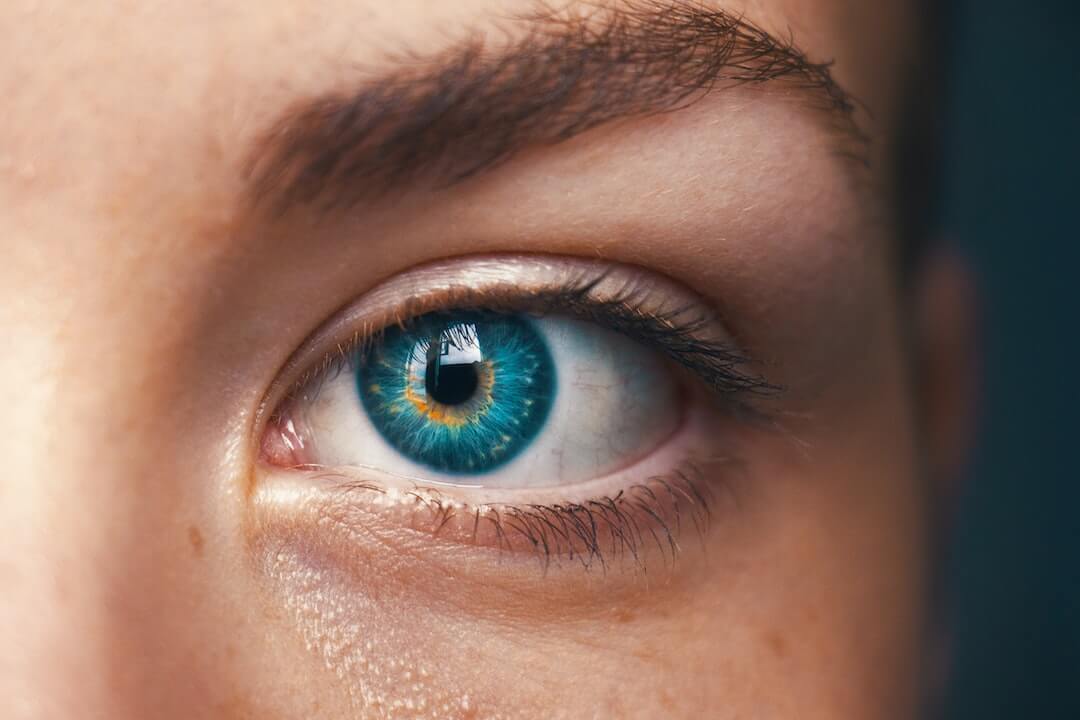

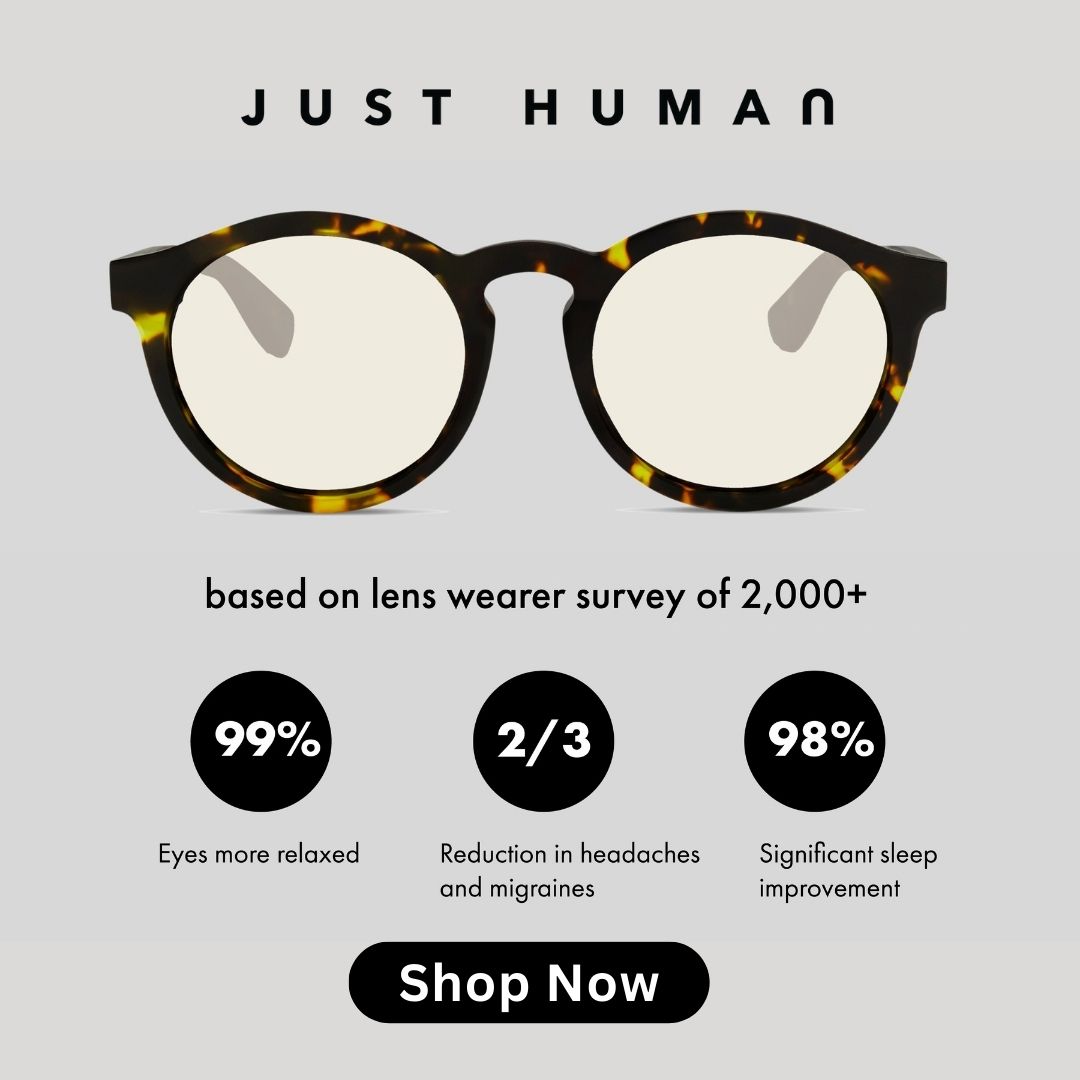
.jpg)
